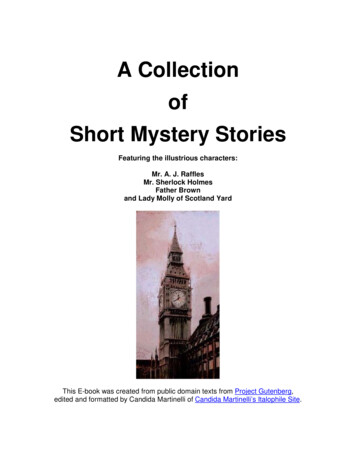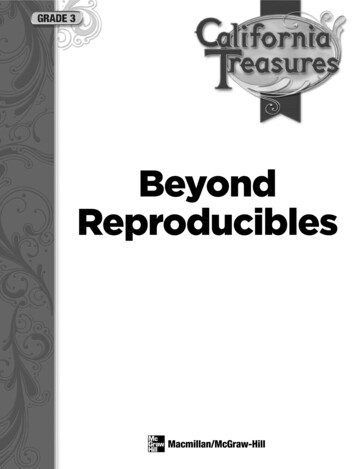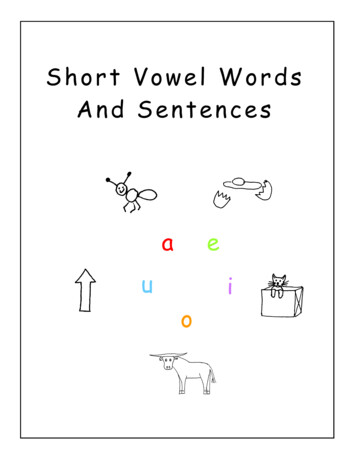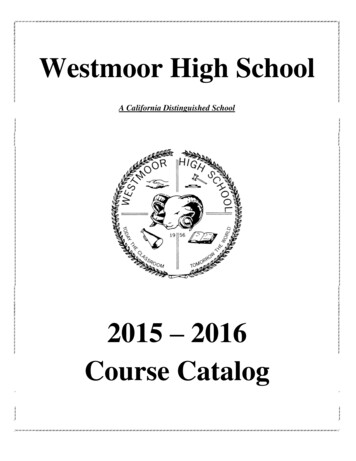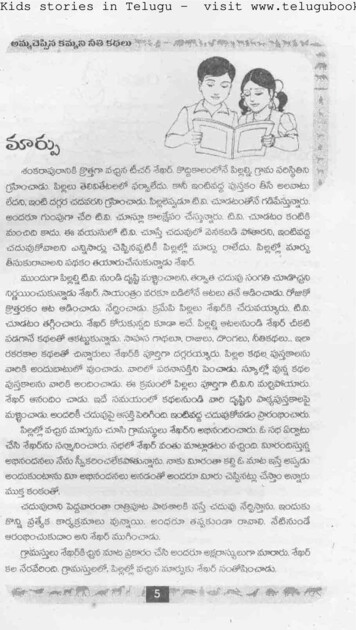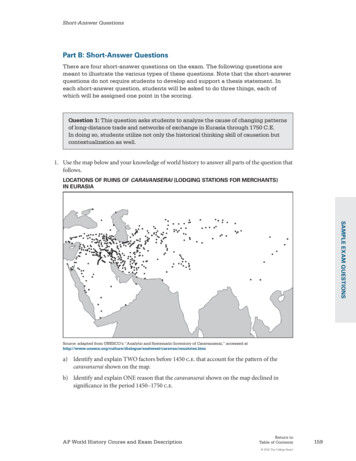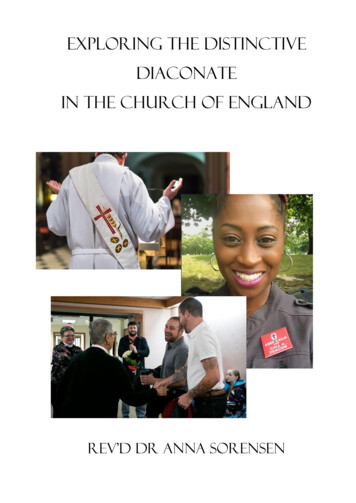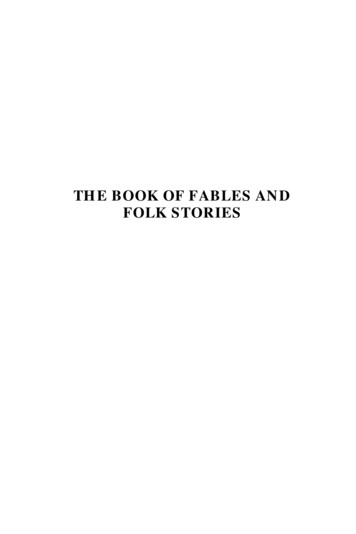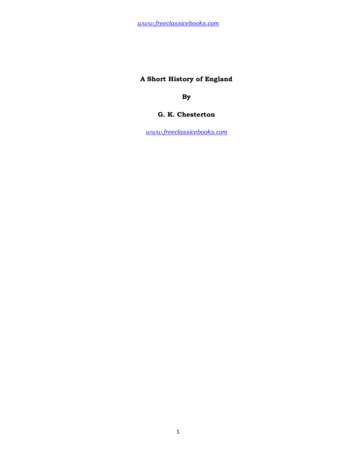
Transcription
www.freeclassicebooks.comA Short History of EnglandByG. K. Chestertonwww.freeclassicebooks.com1
www.freeclassicebooks.comContentsA SHORT HISTORY OF ENGLAND . 3IINTRODUCTION. 3IITHE PROVINCE OF BRITAIN . 6IIITHE AGE OF LEGENDS .12IVTHE DEFEAT OF THE BARBARIANS . 17VST. EDWARD AND THE NORMAN KINGS .23VITHE AGE OF THE CRUSADES.30VIITHE PROBLEM OF THE PLANTAGENETS .36VIIITHE MEANING OF MERRY ENGLAND .43IXNATIONALITY AND THE FRENCH WARS .52XTHE WAR OF THE USURPERS .59XITHE REBELLION OF THE RICH .66XIISPAIN AND THE SCHISM OF NATIONS .75XIIITHE AGE OF THE PURITANS .81XIVTHE TRIUMPH OF THE WHIGS. 89XVTHE WAR WITH THE GREAT REPUBLICS.97XVIARISTOCRACY AND THE DISCONTENTS.104XVIITHE RETURN OF THE BARBARIAN .111XVIIICONCLUSION.1182
www.freeclassicebooks.comA SHORT HISTORY OF ENGLANDIINTRODUCTIONIt will be very reasonably asked why I should consent, though upon a sort ofchallenge, to write even a popular essay in English history, who make no pretenceto particular scholarship and am merely a member of the public. The answer isthat I know just enough to know one thing: that a history from the standpoint ofa member of the public has not been written. What we call the popular historiesshould rather be called the anti-popular histories. They are all, nearly withoutexception, written against the people; and in them the populace is either ignoredor elaborately proved to have been wrong. It is true that Green called his book "AShort History of the English People"; but he seems to have thought it too short forthe people to be properly mentioned. For instance, he calls one very large part ofhis story "Puritan England." But England never was Puritan. It would have beenalmost as unfair to call the rise of Henry of Navarre "Puritan France." And some ofour extreme Whig historians would have been pretty nearly capable of calling thecampaign of Wexford and Drogheda "Puritan Ireland."But it is especially in the matter of the Middle Ages that the popular historiestrample upon the popular traditions. In this respect there is an almost comiccontrast between the general information provided about England in the last twoor three centuries, in which its present industrial system was being built up, andthe general information given about the preceding centuries, which we callbroadly mediæval. Of the sort of waxwork history which is thought sufficient forthe side-show of the age of abbots and crusaders, a small instance will besufficient. A popular Encyclopædia appeared some years ago, professing amongother things to teach English History to the masses; and in this I came upon aseries of pictures of the English kings. No one could expect them to be allauthentic; but the interest attached to those that were necessarily imaginary.There is much vivid material in contemporary literature for portraits of men likeHenry II. or Edward I.; but this did not seem to have been found, or even sought.And wandering to the image that stood for Stephen of Blois, my eye was staggeredby a gentleman with one of those helmets with steel brims curved like a crescent,which went with the age of ruffs and trunk-hose. I am tempted to suspect thatthe head was that of a halberdier at some such scene as the execution of MaryQueen of Scots. But he had a helmet; and helmets were mediæval; and any oldhelmet was good enough for Stephen.Now suppose the readers of that work of reference had looked for the portrait ofCharles I. and found the head of a policeman. Suppose it had been taken,3
www.freeclassicebooks.commodern helmet and all, out of some snapshot in the Daily Sketch of the arrest ofMrs. Pankhurst. I think we may go so far as to say that the readers would haverefused to accept it as a lifelike portrait of Charles I. They would have formed theopinion that there must be some mistake. Yet the time that elapsed betweenStephen and Mary was much longer than the time that has elapsed betweenCharles and ourselves. The revolution in human society between the first of theCrusades and the last of the Tudors was immeasurably more colossal andcomplete than any change between Charles and ourselves. And, above all, thatrevolution should be the first thing and the final thing in anything calling itself apopular history. For it is the story of how our populace gained great things, butto-day has lost everything.Now I will modestly maintain that I know more about English history than this;and that I have as much right to make a popular summary of it as the gentlemanwho made the crusader and the halberdier change hats. But the curious andarresting thing about the neglect, one might say the omission, of mediævalcivilization in such histories as this, lies in the fact I have already noted. It isexactly the popular story that is left out of the popular history. For instance, evena working man, a carpenter or cooper or bricklayer, has been taught about theGreat Charter, as something like the Great Auk, save that its almost monstroussolitude came from being before its time instead of after. He was not taught thatthe whole stuff of the Middle Ages was stiff with the parchment of charters; thatsociety was once a system of charters, and of a kind much more interesting tohim. The carpenter heard of one charter given to barons, and chiefly in theinterest of barons; the carpenter did not hear of any of the charters given tocarpenters, to coopers, to all the people like himself. Or, to take another instance,the boy and girl reading the stock simplified histories of the schools practicallynever heard of such a thing as a burgher, until he appears in a shirt with a nooseround his neck. They certainly do not imagine anything of what he meant in theMiddle Ages. And Victorian shopkeepers did not conceive themselves as takingpart in any such romance as the adventure of Courtrai, where the mediævalshopkeepers more than won their spurs--for they won the spurs of their enemies.I have a very simple motive and excuse for telling the little I know of this true tale.I have met in my wanderings a man brought up in the lower quarters of a greathouse, fed mainly on its leavings and burdened mostly with its labours. I knowthat his complaints are stilled, and his status justified, by a story that is told tohim. It is about how his grandfather was a chimpanzee and his father a wild manof the woods, caught by hunters and tamed into something like intelligence. Inthe light of this, he may well be thankful for the almost human life that he enjoys;and may be content with the hope of leaving behind him a yet more evolvedanimal. Strangely enough, the calling of this story by the sacred name of Progressceased to satisfy me when I began to suspect (and to discover) that it is not true. I4
www.freeclassicebooks.comknow by now enough at least of his origin to know that he was not evolved, butsimply disinherited. His family tree is not a monkey tree, save in the sense thatno monkey could have climbed it; rather it is like that tree torn up by the rootsand named "Dedischado," on the shield of the unknown knight.5
www.freeclassicebooks.comIITHE PROVINCE OF BRITAINThe land on which we live once had the highly poetic privilege of being the end ofthe world. Its extremity was ultima Thule, the other end of nowhere. When theseislands, lost in a night of northern seas, were lit up at last by the longsearchlights of Rome, it was felt that the remotest remnant of things had beentouched; and more for pride than possession.The sentiment was not unsuitable, even in geography. About these realms uponthe edge of everything there was really something that can only be called edgy.Britain is not so much an island as an archipelago; it is at least a labyrinth ofpeninsulas. In few of the kindred countries can one so easily and so strangelyfind sea in the fields or fields in the sea. The great rivers seem not only to meet inthe ocean, but barely to miss each other in the hills: the whole land, though lowas a whole, leans towards the west in shouldering mountains; and a prehistorictradition has taught it to look towards the sunset for islands yet dreamier than itsown. The islanders are of a kind with their islands. Different as are the nationsinto which they are now divided, the Scots, the English, the Irish, the Welsh ofthe western uplands, have something altogether different from the humdrumdocility of the inland Germans, or from the bon sens français which can be at willtrenchant or trite. There is something common to all the Britons, which even Actsof Union have not torn asunder. The nearest name for it is insecurity, somethingfitting in men walking on cliffs and the verge of things. Adventure, a lonely tastein liberty, a humour without wit, perplex their critics and perplex themselves.Their souls are fretted like their coasts. They have an embarrassment, noted byall foreigners: it is expressed, perhaps, in the Irish by a confusion of speech andin the English by a confusion of thought. For the Irish bull is a license with thesymbol of language. But Bull's own bull, the English bull, is "a dumb ox ofthought"; a standing mystification in the mind. There is something double in thethoughts as of the soul mirrored in many waters. Of all peoples they are leastattached to the purely classical; the imperial plainness which the French do finelyand the Germans coarsely, but the Britons hardly at all. They are constantlycolonists and emigrants; they have the name of being at home in every country.But they are in exile in their own country. They are torn between love of homeand love of something else; of which the sea may be the explanation or may beonly the symbol. It is also found in a nameless nursery rhyme which is the finestline in English literature and the dumb refrain of all English poems--"Over thehills and far away."The great rationalist hero who first conquered Britain, whether or no he was thedetached demigod of "Cæsar and Cleopatra," was certainly a Latin of the Latins,6
www.freeclassicebooks.comand described these islands when he found them with all the curt positivism ofhis pen of steel. But even Julius Cæsar's brief account of the Britons leaves on ussomething of this mystery, which is more than ignorance of fact. They wereapparently ruled by that terrible thing, a pagan priesthood. Stones now shapelessyet arranged in symbolic shapes bear witness to the order and labour of thosethat lifted them. Their worship was probably Nature-worship; and while such abasis may count for something in the elemental quality that has always soakedthe island arts, the collision between it and the tolerant Empire suggests thepresence of something which generally grows out of Nature-worship--I mean theunnatural. But upon nearly all the matters of modern controversy Cæsar issilent. He is silent about whether the language was "Celtic"; and some of theplace-names have even given rise to a suggestion that, in parts at least, it wasalready Teutonic. I am not capable of pronouncing upon the truth of suchspeculations, but I am of pronouncing upon their importance; at least, to my ownvery simple purpose. And indeed their importance has been very muchexaggerated. Cæsar professed to give no more than the glimpse of a traveller; butwhen, some considerable time after, the Romans returned and turned Britain intoa Roman province, they continued to display a singular indifference to questionsthat have excited so many professors. What they cared about was getting andgiving in Britain what they had got and given in Gaul. We do not know whetherthe Britons then, or for that matter the Britons now, were Iberian or Cymric orTeutonic. We do know that in a short time they were Roman.Every now and then there is discovered in modern England some fragment suchas a Roman pavement. Such Roman antiquities rather diminish than increase theRoman reality. They make something seem distant which is still very near, andsomething seem dead that is still alive. It is like writing a man's epitaph on hisfront door. The epitaph would probably be a compliment, but hardly a personalintroduction. The important thing about France and England is not that theyhave Roman remains. They are Roman remains. In truth they are not so muchremains as relics; for they are still working miracles. A row of poplars is a moreRoman relic than a row of pillars. Nearly all that we call the works of nature havebut grown like fungoids upon this original work of man; and our woods aremosses on the bones of a giant. Under the seed of our harvests and the roots ofour trees is a foundation of which the fragments of tile and brick are butemblems; and under the colours of our wildest flowers are the colours of a Romanpavement.Britain was directly Roman for fully four hundred years; longer than she hasbeen Protestant, and very much longer than she has been industrial. What wasmeant by being Roman it is necessary in a few lines to say, or no sense can bemade of what happened after, especially of what happened immediately after.Being Roman did not mean being subject, in the sense that one savage tribe will7
www.freeclassicebooks.comenslave another, or in the sense that the cynical politicians of recent timeswatched with a horrible hopefulness for the evanescence of the Irish. Bothconquerors and conquered were heathen, and both had the institutions whichseem to us to give an inhumanity to heathenism: the triumph, the slave-market,the lack of all the sensitive nationalism of modern history. But the Roman Empiredid not destroy nations; if anything, it created them. Britons were not originallyproud of being Britons; but they were proud of being Romans. The Roman steelwas at least as much a magnet as a sword. In truth it was rather a round mirrorof steel, in which every people came to see itself. For Rome as Rome the verysmallness of the civic origin was a warrant for the largeness of the civicexperiment. Rome itself obviously could not rule the world, any more thanRutland. I mean it could not rule the other races as the Spartans ruled the Helotsor the Americans ruled the negroes. A machine so huge had to be human; it hadto have a handle that fitted any man's hand. The Roman Empire necessarilybecame less Roman as it became more of an Empire; until not very long afterRome gave conquerors to Britain, Britain was giving emperors to Rome. Out ofBritain, as the Britons boasted, came at length the great Empress Helena, whowas the mother of Constantine. And it was Constantine, as all men know, whofirst nailed up that proclamation which all after generations have in truth beenstruggling either to protect or to tear down.About that revolution no man has ever been able to be impartial. The presentwriter will make no idle pretence of being so. That it was the most revolutionaryof all revolutions, since it identified the dead body on a servile gibbet with thefatherhood in the skies, has long been a commonplace without ceasing to be aparadox. But there is another historic element that must also be realized.Without saying anything more of its tremendous essence, it is very necessary tonote why even pre-Christian Rome was regarded as something mystical for longafterwards by all European men. The extreme view of it was held, perhaps, byDante; but it pervaded mediævalism, and therefore still haunts modernity. Romewas regarded as Man, mighty, though fallen, because it was the utmost that Manhad done. It was divinely necessary that the Roman Empire should succeed--ifonly that it might fail. Hence the school of Dante implied the paradox that theRoman soldiers killed Christ, not only by right, but even by divine right. Thatmere law might fail at its highest test it had to be real law, and not mere militarylawlessness. Therefore God worked by Pilate as by Peter. Therefore the mediævalpoet is eager to show that Roman government was simply good government, andnot a usurpation. For it was the whole point of the Christian revolution tomaintain that in this, good government was as bad as bad. Even goodgovernment was not good enough to know God among the thieves. This is notonly generally important as involving a colossal change in the conscience; the lossof the whole heathen repose in the complete sufficiency of the city or the state. Itmade a sort of eternal rule enclosing an eternal rebellion. It must be incessantly8
www.freeclassicebooks.comremembered through the first half of English history; for it is the whole meaningin the quarrel of the priests and kings.The double rule of the civilization and the religion in one sense remained forcenturies; and before its first misfortunes came it must be conceived assubstantially the same everywhere. And however it began it largely ended inequality. Slavery certainly existed, as it had in the most democratic states ofancient times. Harsh officialism certainly existed, as it exists in the mostdemocratic states of modern times. But there was nothing of what we mean inmodern times by aristocracy, still less of what we mean by racial domination. Inso far as any change was passing over that society with its two levels of equalcitizens and equal slaves, it was only the slow growth of the power of the Churchat the expense of the power of the Empire. Now it is important to grasp that thegreat exception to equality, the institution of Slavery, was slowly modified by bothcauses. It was weakened both by the weakening of the Empire and by thestrengthening of the Church.Slavery was for the Church not a difficulty of doctrine, but a strain on theimagination. Aristotle and the pagan sages who had defined the servile or "useful"arts, had regarded the slave as a tool, an axe to cut wood or whatever wantedcutting. The Church did not denounce the cutting; but she felt as if she wascutting glass with a diamond. She was haunted by the memory that the diamondis so much more precious than the glass. So Christianity could not settle downinto the pagan simplicity that the man was made for the work, when the workwas so much less immortally momentous than the man. At about this stage of ahistory of England there is generally told the anecdote of a pun of Gregory theGreat; and this is perhaps the true point of it. By the Roman theory the barbarianbondmen were meant to be useful. The saint's mysticism was moved at findingthem ornamental; and "Non Angli sed Angeli" meant more nearly "Not slaves, butsouls." It is to the point, in passing, to note that in the modern country mostcollectively Christian, Russia, the serfs were always referred to as "souls." Thegreat Pope's phrase, hackneyed as it is, is perhaps the first glimpse of the goldenhalos in the best Christian Art. Thus the Church, with whatever other faults,worked of her own nature towards greater social equality; and it is a historicalerror to suppose that the Church hierarchy worked with aristocracies, or was of akind with them. It was an inversion of aristocracy; in the ideal of it, at least, thelast were to be first. The Irish bull that "One man is as good as another and agreat deal better" contains a truth, like many contradictions; a truth that was thelink between Christianity and citizenship. Alone of all superiors, the saint doesnot depress the human dignity of others. He is not conscious of his superiority tothem; but only more conscious of his inferiority than they are.But while a million little priests and monks like mice were already nibbling at the9
www.freeclassicebooks.combonds of the ancient servitude, another process was going on, which has herebeen called the weakening of the Empire. It is a process which is to this day verydifficult to explain. But it affected all the institutions of all the provinces,especially the institution of Slavery. But of all the provinces its effect was heaviestin Britain, which lay on or beyond the borders. The case of Britain, however,cannot possibly be considered alone. The first half of English history has beenmade quite unmeaning in the schools by the attempt to tell it without reference tothat corporate Christendom in which it took part and pride. I fully accept thetruth in Mr. Kipling's question of "What can they know of England who onlyEngland know?" and merely differ from the view that they will best broaden theirminds by the study of Wagga-Wagga and Timbuctoo. It is therefore necessary,though very difficult, to frame in few words some idea of what happened to thewhole European race.Rome itself, which had made all that strong world, was the weakest thing in it.The centre had been growing fainter and fainter, and now the centre disappeared.Rome had as much freed the world as ruled it, and now she could rule no more.Save for the presence of the Pope and his constantly increasing supernaturalprestige, the eternal city became like one of her own provincial towns. A looselocalism was the result rather than any conscious intellectual mutiny. There wasanarchy, but there was no rebellion. For rebellion must have a principle, andtherefore (for those who can think) an authority. Gibbon called his great pageantof prose "The Decline and Fall of the Roman Empire." The Empire did decline, butit did not fall. It remains to this hour.By a process very much more indirect even than that of the Church, thisdecentralization and drift also worked against the slave-state of antiquity. Thelocalism did indeed produce that choice of territorial chieftains which came to becalled Feudalism, and of which we shall speak later. But the direct possession ofman by man the same localism tended to destroy; though this negative influenceupon it bears no kind of proportion to the positive influence of the CatholicChurch. The later pagan slavery, like our own industrial labour whichincreasingly resembles it, was worked on a larger and larger scale; and it was atlast too large to control. The bondman found the visible Lord more distant thanthe new invisible one. The slave became the serf; that is, he could be shut in, butnot shut out. When once he belonged to the land, it could not be long before theland belonged to him. Even in the old and rather fictitious language of chattelslavery, there is here a difference. It is the difference between a man being a chairand a man being a house. Canute might call for his throne; but if he wanted histhrone-room he must go and get it himself. Similarly, he could tell his slave torun, but he could only tell his serf to stay. Thus the two slow changes of the timeboth tended to transform the tool into a man. His status began to have roots; andwhatever has roots will have rights.10
www.freeclassicebooks.comWhat the decline did involve everywhere was decivilization; the loss of letters, oflaws, of roads and means of communication, the exaggeration of local colour intocaprice. But on the edges of the Empire this decivilization became a definitebarbarism, owing to the nearness of wild neighbours who were ready to destroyas deafly and blindly as things are destroyed by fire. Save for the lurid andapocalyptic locust-flight of the Huns, it is perhaps an exaggeration to talk, even inthose darkest ages, of a deluge of the barbarians; at least when we are speakingof the old civilization as a whole. But a deluge of barbarians is not entirely anexaggeration of what happened on some of the borders of the Empire; of suchedges of the known world as we began by describing in these pages. And on theextreme edge of the world lay Britain.It may be true, though there is little proof of it, that the Roman civilization itselfwas thinner in Britain than in the other provinces; but it was a very civilizedcivilization. It gathered round the great cities like York and Chester and London;for the cities are older than the counties, and indeed older even than thecountries. These were connected by a skeleton of great roads which were and arethe bones of Britain. But with the weakening of Rome the bones began to breakunder barbarian pressure, coming at first from the north; from the Picts who laybeyond Agricola's boundary in what is now the Scotch Lowlands. The whole ofthis bewildering time is full of temporary tribal alliances, generally mercenary; ofbarbarians paid to come on or barbarians paid to go away. It seems certain thatin this welter Roman Britain bought help from ruder races living about that neckof Denmark where is now the duchy of Schleswig. Having been chosen only tofight somebody they naturally fought anybody; and a century of fighting followed,under the trampling of which the Roman pavement was broken into yet smallerpieces. It is perhaps permissible to disagree with the historian Green when hesays that no spot should be more sacred to modern Englishmen than theneighbourhood of Ramsgate, where the Schleswig people are supposed to havelanded; or when he suggests that their appearance is the real beginning of ourisland story. It would be rather more true to say that it was nearly, thoughprematurely, the end of it.11
www.freeclassicebooks.comIIITHE AGE OF LEGENDSWe should be startled if we were quietly reading a prosaic modern novel, andsomewhere in the middle it turned without warning into a fairy tale. We should besurprised if one of the spinsters in Cranford, after tidily sweeping the room with abroom, were to fly away on a broomstick. Our attention would be arrested if oneof Jane Austen's young ladies who had just met a dragoon were to walk a littlefurther and meet a dragon. Yet something very like this extraordinary transitiontakes place in British history at the end of the purely Roman period. We have todo with rational and almost mechanical accounts of encampment andengineering, of a busy bureaucracy and occasional frontier wars, quite modern intheir efficiency and inefficiency; and then all of a sudden we are reading ofwandering bells and wizard lances, of wars against men as tall as trees or asshort as toadstools. The soldier of civilization is no longer fighting with Goths butwith goblins; the land becomes a labyrinth of faërie towns unknown to history;and scholars can suggest but cannot explain how a Roman ruler or a Welshchieftain towers up in the twilight as the awful and unbegotten Arthur. Thescientific age comes first and the mythological age after it. One working example,the echoes of which lingered till very late in English literature, may serve to sumup the contrast. The British state which was found by Cæsar was long believed tohave been founded by Brutus. The contrast between the one very dry discoveryand the other very fantastic foundation has something decidedly comic about it;as if Cæsar's "Et tu, Brute," might be translated, "What, you here?" But in onerespect the fable is quite as important as the fact. They both testify to the realityof the Roman foundation of our insular society, and show that even the storiesthat seem prehistoric are seldom pre-Roman. When England is Elfland, the elvesare not the Angles. All the phrases that can be used as clues through that tangleof traditions are more or less Latin phrases. And in all our speech there was noword more Roman than "romance."The Roman legions left Britain in the fourth century. This did not mean that theRoman civilization left it; but it did mean that the civilization lay far more openboth to admixture and attack. Christianity had almost certainly come to Britain,not indeed otherwise than by the routes established by Rome, but certainly longbefore the official Roman mission of Gregory the Great. It had certainly beenlargely swamped by later heathen invasions of the undefended coasts. It maythen rationally be urged that the hold both of the Empire and its new religionwere here weaker than elsewhere, and that the description of the generalcivilization in the last chapter is proportionately irrelevant. This, however, is notthe chief truth of the matter.12
www.freeclassicebooks.comThere is one fundamental fact which must be understood of the whole of thisperiod. Yet a modern man must very nearly turn his mind upside down tounderstand it. Almost every modern man has in his head an association betweenfreedom and the future. The whole culture of our time has been full of the notionof "A Good Time Coming." Now the whole c
in the English by a confusion of thought. For the Irish bull is a license with the symbol of language. But Bull's own bull, the English bull, is "a dumb ox of thought"; a standing mystification in the mind. There is something double in the thoughts as of the soul mirrored in many waters. Of all peoples they are least
